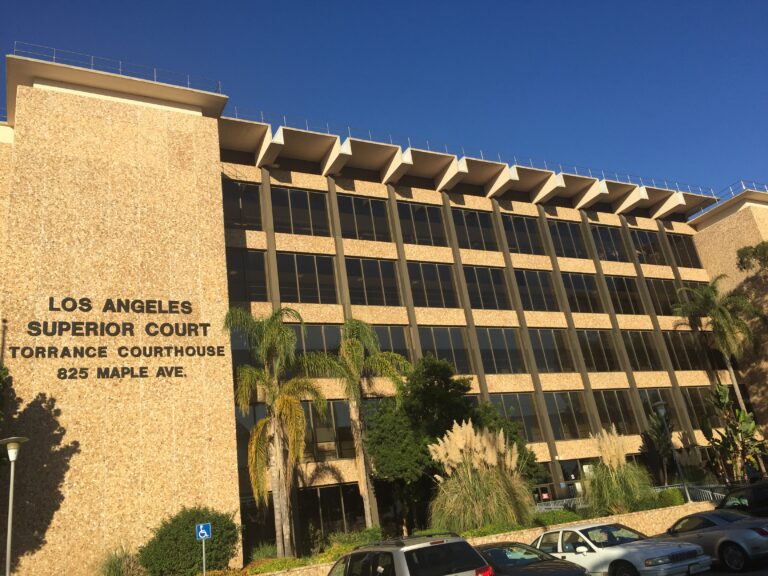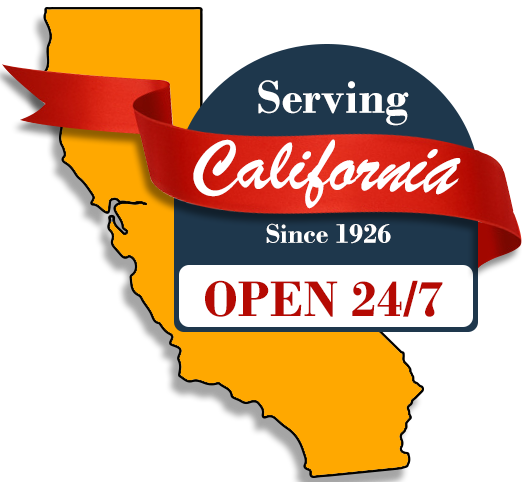Torrance Courthouse OVerview
Court Address:
The Torrance Courthouse is located at:
825 Maple Ave, Torrance, CA 90503
Phone Number:
For information on criminal, civil, family law, or traffic cases, contact the courthouse directly at:
(310) 787-3880
Hours of Operation:
The Torrance Courthouse is generally open:
Monday through Friday, 8:00 AM to 4:30 PM
Note: Certain departments may operate on varying schedules, so it’s always recommended to call ahead or check online for the most accurate information.
Website:
For case lookups, court schedules, and department contacts, visit the official Los Angeles County Courts website:
Torrance Courthouse Website
This overview provides the essential information for the Torrance Courthouse in a consistent format. Let me know if you’d like to adjust or add any further details!

Jurisdiction & Case Types – Torrance Courthouse
Jurisdiction Overview:
The Torrance Courthouse is one of the key courthouses in Los Angeles County, handling a wide range of cases across various legal areas. Located in the city of Torrance, this courthouse serves the southern region of Los Angeles County, providing justice in criminal, civil, family law, and traffic matters. It plays a significant role in ensuring fair and efficient resolution of cases for the local community.
Types of Cases Handled:
Criminal Cases:
- Felony Charges: Serious crimes such as assault, robbery, burglary, and drug trafficking.
- Misdemeanors: Lesser offenses like petty theft, vandalism, and simple assault.
- DUI (Driving Under the Influence): Cases involving driving while intoxicated by alcohol or drugs.
- Domestic Violence: Assault or abuse between family members or intimate partners.
Civil Cases:
- Personal Injury: Lawsuits for injuries sustained due to accidents, negligence, or unsafe conditions.
- Contract Disputes: Disagreements between parties regarding business contracts, employment agreements, or other contractual matters.
- Property Disputes: Legal issues involving real estate, including landlord-tenant disputes, eviction cases, or property damage.
Family Law Cases:
- Divorce: Legal dissolution of marriage, including property division, spousal support, and child custody.
- Child Custody & Support: Determining where children will live and how much financial support will be provided.
- Spousal Support: Financial assistance to a former spouse after divorce, based on financial need and other factors.
- Domestic Violence Restraining Orders: Protective orders issued to prevent further abuse or harassment.
Traffic Cases:
- Speeding Tickets: Violations of traffic laws related to driving speed limits.
- Reckless Driving: Charges for driving in a manner that endangers public safety.
- Driving Without a License: Driving without a valid driver’s license or permit.
- DUI Offenses: Driving under the influence of alcohol or drugs.
How Torrance Courthouse Differs from Other Locations:
- The Torrance Courthouse stands out as a facility that manages a wide variety of legal matters, with an emphasis on serving the southern Los Angeles County region. It handles both criminal and civil cases, along with a strong focus on family law and traffic violations. Its central location in Torrance makes it a key venue for local residents seeking to resolve legal issues quickly and efficiently.
How Bail Works at the Torrance Courthouse in Los Angeles
Bail Process Overview:
When a defendant is arrested and charged with a criminal offense, the Torrance Courthouse is where the bail hearing will take place. During this hearing, the judge will determine whether bail is granted, the bail amount, and any other conditions for release. The purpose of bail is to ensure that the defendant will return for their court hearings while allowing them to be free until the trial or resolution of their case.
Bail Hearing:
The bail hearing is usually scheduled within 48 to 72 hours of an arrest (excluding weekends and holidays). During the hearing, the judge will review the nature of the offense, the defendant’s criminal history, and other factors to set the amount of bail or decide if it should be denied.
Factors That Influence Bail Decisions:
Several factors are taken into account when the judge decides on the bail amount:
Severity of the Alleged Offense:
Serious offenses such as violent crimes or large-scale theft may result in a higher bail amount or denial of bail.
Prior Criminal History:
Defendants with a history of criminal offenses or prior arrests may face a higher bail amount.
Flight Risk:
If the judge believes the defendant is likely to flee or fail to appear for future court hearings, they may impose a higher bail amount or deny bail.
Community Safety Concerns:
The judge will also consider whether the defendant poses a risk to public safety. If so, the judge may decide to keep the defendant in custody.
Alternative Release Options:
In some cases, the court may decide that the defendant can be released without posting traditional bail. Some alternatives to bail include:
Release on Own Recognizance (OR):
The defendant is released without bail, with the understanding that they will appear for all future court hearings.
Supervised Release:
The defendant may be released to a parent, guardian, or other responsible adult but will be monitored by probation officers or other authorities.
Electronic Monitoring (Ankle Bracelet):
The defendant may be released with an ankle bracelet or other electronic monitoring devices to track their whereabouts.
House Arrest or Placement in a Rehabilitation Program:
For some defendants, the court may approve house arrest or placement in a rehabilitation program rather than remaining in custody.
Armstrong Bail Bonds Support:
While traditional bail may be applied in most criminal cases, Armstrong Bail Bonds is here to support families through the entire process. We assist with:
Securing bail for defendants at the Torrance Courthouse.
Providing payment plans and financial assistance for bail amounts.
Offering 24/7 assistance, guidance, and court date reminders to ensure the defendant stays in compliance with all court orders.
Helping to coordinate with attorneys, probation officers, and family members to ensure a smooth release process.


👩⚖️ Court Appearances & Visitation – Torrance Courthouse, Los Angeles
Court Appearance Responsibilities:
Defendants are legally required to attend all scheduled court hearings at the Torrance Courthouse. Missing a court appearance can result in severe consequences, including the issuance of a bench warrant for the defendant’s arrest, revocation of bail, or other legal penalties. Court appearances are critical in ensuring the case progresses, and failure to appear can significantly affect the outcome.
Why Court Attendance Matters:
Every court hearing plays an important role in the legal process. Whether it’s the arraignment, pretrial conference, trial, or sentencing hearing, these proceedings are essential for moving the case forward. Defendants should:
- Arrive on time for all hearings.
- Dress appropriately for court.
- Bring all requested documents or evidence as per the court’s instructions.
- Maintain open communication with their attorney and bail bondsman to ensure they are prepared and meet all legal obligations.
Consequences of Missing Court:
If a defendant fails to appear at their scheduled court hearing, the judge may:
- Issue a bench warrant for the defendant’s arrest.
- Increase the bail amount or revoke bail entirely.
- Cause delays in the court process, which could prolong the case and lead to longer detention or more severe penalties.
Inmate Visitation Guidelines (For Defendants in Custody):
If a defendant is detained during their court proceedings, they will be held at one of the Los Angeles County jail facilities, such as Men’s Central Jail or Twin Towers Correctional Facility. The Torrance Courthouse itself does not facilitate inmate visitation; however, visits can be arranged through the detention facilities.
Visitation Hours & Scheduling:
- Visitation must be scheduled in advance through the facility where the defendant is being held.
- Men’s Central Jail and Twin Towers Correctional Facility are the primary detention facilities where inmates related to Torrance Courthouse cases are held.
- Only approved family members or legal guardians are allowed to visit.
- Visitation Contact Information:
- Men’s Central Jail:
Phone: (213) 473-6100
Address: 441 Bauchet St., Los Angeles, CA 90012 - Twin Towers Correctional Facility:
Phone: (213) 473-6100
Address: 450 Bauchet St., Los Angeles, CA 90012
- Men’s Central Jail:
Visitor Rules & Requirements:
Visitors must comply with strict security measures to ensure safety and proper conduct within the facility:
- A valid government-issued ID is required for all visitors.
- Appropriate clothing must be worn (no revealing or gang-related clothing).
- Personal items such as phones, food, and bags are not allowed inside the detention facility.
- Visitors must remain calm and respectful. Disruptive behavior can result in the denial or cancellation of the visit.
Common Charges Handled at the Torrance Courthouse – Los Angeles
The Torrance Courthouse handles a wide range of criminal, civil, family law, and traffic cases. Below are some of the most common charges and cases brought before this courthouse:
Criminal Charges:
Drug Offenses:
Possession of Controlled Substances: Including marijuana (above legal limits), cocaine, methamphetamine, heroin, and other illegal drugs.
Possession with Intent to Sell: When a defendant is caught with a large quantity of drugs, indicating the possibility of distribution.
Drug Trafficking & Distribution: Involves the sale, transportation, or distribution of illegal substances.
Driving Under the Influence (DUI): Driving under the influence of alcohol or drugs, including prescription medication.
Theft & Property Crimes:
Petty Theft & Shoplifting: Stealing items valued at $950 or less, usually from retail stores.
Grand Theft: Stealing property valued over $950, or the theft of a vehicle or a firearm.
Burglary: Entering a building, home, or vehicle with the intent to commit theft, vandalism, or another crime.
Vandalism & Graffiti: Damaging or defacing public or private property.
Violent Crimes:
Assault & Battery: Physical altercations ranging from minor physical harm to more serious assaults involving weapons or causing injury.
Robbery: Stealing from a person through force, fear, or intimidation.
Manslaughter: The unlawful killing of another person without premeditation or intent, typically due to reckless behavior or heat of passion.
Sex Crimes:
Rape & Sexual Assault: Non-consensual sexual acts, including rape, molestation, and sexual battery.
Child Abuse & Molestation: Physical, emotional, or sexual harm done to minors.
Indecent Exposure & Lewd Acts: Inappropriate behavior in public, such as exposing oneself or engaging in lewd acts.
Weapons Offenses:
Possession of a Firearm or Knife: Carrying weapons without a permit or carrying a concealed weapon.
Assault with a Deadly Weapon: Using a weapon to threaten or harm another individual.
Brandishing a Weapon: Displaying a weapon in a threatening manner.
Civil Cases:
Personal Injury:
Lawsuits for injuries sustained in accidents, whether from motor vehicle accidents, slip-and-fall incidents, or injuries due to negligence.
Contract Disputes:
Disagreements over the terms, enforcement, or breach of contracts, including business contracts, leases, and other agreements.
Property Disputes:
Issues related to the ownership, use, or damage of property, including real estate disputes and landlord-tenant conflicts.
Employment Disputes:
Cases related to wrongful termination, workplace discrimination, sexual harassment, wage disputes, and other employment-related issues.
Family Law Cases:
Divorce & Dissolution of Marriage:
The legal termination of a marriage, including division of assets, spousal support, and child custody arrangements.
Child Custody & Support:
Determining where children will live, visitation schedules, and the amount of financial support that will be provided by each parent.
Spousal Support:
Financial assistance given to a spouse after divorce or separation based on need and the marriage’s length and circumstances.
Domestic Violence Restraining Orders:
Orders of protection issued to prevent further abuse, harassment, or threats between intimate partners or family members.
Traffic Violations:
Speeding:
Violations for driving faster than the posted speed limit or driving too fast for road conditions.
Reckless Driving:
Driving in a manner that endangers others, such as excessive speeding, racing, or running red lights.
Driving Without a License:
Driving without a valid driver’s license or without proper documentation.
DUI Offenses:
Driving under the influence of alcohol, drugs, or both, leading to impaired driving ability and potential accidents.
Frequently asked questions about Torrance Courthouse
Where is the Torrance Courthouse located?
The Torrance Courthouse is located at:
825 Maple Ave, Torrance, CA 90503. It serves the southern region of Los Angeles County, providing access to justice for residents of Torrance and surrounding areas.
What types of cases are handled at the Torrance Courthouse?
The Torrance Courthouse handles a variety of cases, including:
Criminal cases (felonies, misdemeanors, DUI, domestic violence, etc.)
Civil cases (personal injury, contract disputes, property issues)
Family law cases (divorce, child custody, spousal support, etc.)
Traffic violations (speeding, reckless driving, DUI, etc.)
How soon will I see a judge after being arrested?
A defendant will typically have their arraignment within 48 to 72 hours of arrest (excluding weekends and holidays). At this hearing, charges will be read, and bail or other release conditions will be discussed.
Is there bail at the Torrance Courthouse?
Yes, bail is available for criminal cases at the Torrance Courthouse. The judge will determine the bail amount based on factors such as the severity of the charge and the defendant’s prior criminal history. Armstrong Bail Bonds can assist in securing bail and providing guidance throughout the process.
How do I pay for bail?
Armstrong Bail Bonds offers several payment options for securing release, including credit cards, debit cards, bank transfers, and cash payments. We also provide flexible payment plans for eligible defendants.
What happens if I miss a court appearance?
Missing a court appearance can have serious consequences, including:
The issuance of a bench warrant for arrest.
Increased bail or revocation of bail.
Delays in the court process, which could lead to a longer detention or harsher legal penalties.
Can I visit someone incarcerated at Torrance Courthouse?
The Torrance Courthouse itself does not have inmate visitation. However, if a defendant is incarcerated, they are typically held at Men’s Central Jail or Twin Towers Correctional Facility. Visitation must be scheduled in advance through the relevant facility.
How do I schedule a visit to an inmate?
To schedule a visit with an inmate, you must contact the facility where the defendant is being held, such as Men’s Central Jail or Twin Towers. You will need to follow the facility’s visitation rules and schedule a time in advance.
Men’s Central Jail: (213) 473-6100
Twin Towers Correctional Facility: (213) 473-6100
Can Armstrong Bail Bonds help if there’s no bail set?
Yes, even if bail is not set, Armstrong Bail Bonds can assist in navigating the court process. We work with probation officers and legal counsel to ensure your case moves forward smoothly and help coordinate the minor’s release through other legal means, such as supervised release or electronic monitoring.
How do I get help from Armstrong Bail Bonds?
You can reach Armstrong Bail Bonds 24/7 by calling (818) 241-2171. Our team is here to guide you through the bail process, provide updates on court dates, and offer reliable support throughout the legal proceedings.



